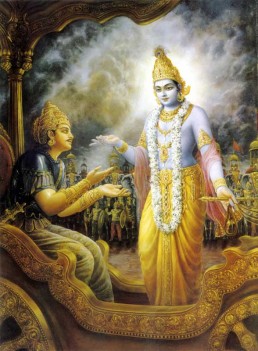Commentary
These two verses conclude the third chapter of The Gita giving the seeker a technique to conquer desire, the inner enemy. The Upanishadic method of meditation for the withdrawal of ego from the outer world of sense objects to the inner world of the Self for the purposes of curbing desire oriented tendencies and thereby achieving Self-discovery is commended here. These verses give us the hierarchy of levels of consciousness.
The physical body is gross, external and limited. As compared to this the senses are superior because they are subtler and more internal and have a wider range of activity. Superior to the senses is the mind as it can direct the function of the senses (as it can undertake the work of the senses also). Superior to the mind is the intellect because it is endowed with the faculty of discrimination and finality; when the mind doubts, the intellect decides. But The Self is superior to even the intellect because the intellect draws its power to illuminate from the Self alone. The Self is the indweller in the body, the Witness of the activities of the body, senses, mind and intellect.
Sri Krishna advises Arjuna to conquer desire with this understanding of the superior power of the Self, though it is difficult to achieve. The Lord points out that a man of discrimination and dispassion will be able to achieve this by increasing his Sattwic quality and by appealing to the indwelling Presence, The Self, through meditation. This
controlling of the lower self i.e. the mind with the knowledge of the Higher Self is termed here as ‘restraining the self by the Self’.
The technique of meditation is a conscious withdrawal of all our identifications with our body, mind and intellect and thereby turning our awareness or desire-faculty towards our diviner existence where the ego is under the perfect control of the Self with no desires to agitate the mind any more.
Thus a constructive re-organization of life is taught here by the Gita without the suppression or rejection of the life’s situations.
‘This Chapter expounds the necessity for the performance of work without any selfish attachment to results, with a view to securing the welfare of the world, with the realization that agency belongs to the modes of prakriti or to God himself.’ – Dr. S. Radhakrishnan.
Swami Chinmayananda Commentary
The commentary on this verse and the rest, is avaialble for free as:
Kindle eBook
Google Play Book
Apple Books
Adi Sankara Commentary
The learned ones ahuh, say; that indriyani, the five [Five sense-organs: of vision, hearning, taste, smell and touch; five motor-organs: hands, feet, speech, and for excretion and generation-these latter five are also understood in the present context.] organs-ear etc., are parani, superior, to the external, gross and limited body, from the point of view of subtlety, inner position, pervasiveness, etc. So also, manah, the mind, having the nature of thinking and doubting; [Sankalpa: will, volition, intention, thought, reflection, imangination, etc. vikalpa:doubt, uncertainly, indecision, suspicion, error, etc.-V. S. A.] is param, superior; indriyebhyah, to the organs. Similarly, buddhih, the intellect, having the nature of determination; is para, superior; manasah, to the mind. And yah, the one who is innermost as compared with all the objects of perception ending with the intellect, and with regard to which Dweller in the body it has been said that desire, in association with its ‘abodes’ counting from the organs, deludes It by shrouding Knowledge; sah, that one; is tu, however; paratah, superior; buddheh, to the intellect- He, the supreme Self, is the witness of the intellect. [The portion, ‘with regard to which Dweller… the supreme Self,’ is translated from Ast. Which has the same reading here as the A. A. The G1. Pr. Makes the “abode”
counting from the organs’ an adjective of ‘the Dweller in the body’, and omits the portion, ‘is tu, however… buddheh, to the intellect’.-Tr.]
The Bhagavad Gita with the commentary of Sri Sankaracharya – Translated by Alladi Mahadeva Sastry
Holy Geeta – Commentary by Swami Chinmayananda
The Bhagavad Gita by Eknath Easwaran – Best selling translation of the Bhagavad Gita
The Bhagavad Gita – Translation and Commentary by Swami Sivananda
Bhagavad Gita – Translation and Commentary by Bhaktivedanta Swami Prabupadha
Srimad Bhagavad Gita Chapter 3 – Verse 42 – 3.42 indriyani paranyahur – All Bhagavad Gita (Geeta) Verses in Sanskrit, English, Transliteration, Word Meaning, Translation, Audio, Shankara Bhashya, Adi Sankaracharya Commentary and Links to Videos by Swami Chinmayananda and others – 3-42

